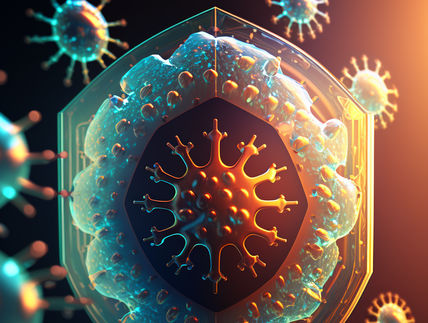Casting a wide net to fight coronaviruses
coronaviruses - the family of viruses that causes the common cold - gained widespread recognition when the deadly severe acute respiratory syndrome, familiarly known as SARS, killed at least 800 people in 2003. Research efforts to design antiviral agents to combat coronaviruses intensified after the SARS epidemic and have focused mostly on just this virus. But because coronavirus sequences and structures mutate so quickly, a challenge is to find wide-spectrum vaccines, since a vaccine targeting one strain would likely be ineffective against another.
Online in the open-access journal PLoS Biology, Haitao Yang, Dawei Ma, Zihe Rao, and colleagues report that they have produced an antiviral inhibitor that is active against several coronaviruses. The authors combined structural and biochemical analyses to identify a target in the structurally conserved substrate-binding region of the main protease (Mpro). Since humans and other animals have no proteins similar to Mpro, the likelihood of deleterious side effects is low. The substrate-binding site is especially attractive as a target for drug development because evolutionarily conserved regions do not undergo high mutation rates like the rest of the viral genome, allowing antiviral drugs to maintain their effectiveness.
Yang et al. created a synthetic version of the Mpro substrate - reasoning that if they could inhibit the substrate's access to the binding site by the mimic (known as suicide inhibitors), they should be able to block the protease's activity and maybe halt viral replication. The authors designed a synthetic inhibitor that bound strongly to the protease and used it as a base to design a panel of inhibitors, which allowed them to identify compounds that rapidly blocked proteases from multiple coronaviruses and kept the coronaviruses from reproducing. The compounds caused no obvious damage in human cells in the experiments.
The compounds developed in this study inhibit Mpro from new coronavirus strains that cause conjunctivitis, bronchiolitis, and pneumonia. By identifying promising candidates for drugs capable of targeting the entire Coronavirus genus, Yang et al. have laid the foundation for containing everything from the common cold to the deadly SARS virus. Preclinical and clinical trials will show whether these compounds live up to their promise.
Citation: H. Yang, W. Xie, X. Xue, K. Yang, J. Ma, et al.; "Design of wide-spectrum inhibitors targeting coronavirus main proteases.", PLoS Biol 2005; 3(10); e324.
Most read news
Topics
Organizations
Other news from the department science

Get the life science industry in your inbox
By submitting this form you agree that LUMITOS AG will send you the newsletter(s) selected above by email. Your data will not be passed on to third parties. Your data will be stored and processed in accordance with our data protection regulations. LUMITOS may contact you by email for the purpose of advertising or market and opinion surveys. You can revoke your consent at any time without giving reasons to LUMITOS AG, Ernst-Augustin-Str. 2, 12489 Berlin, Germany or by e-mail at revoke@lumitos.com with effect for the future. In addition, each email contains a link to unsubscribe from the corresponding newsletter.
Most read news
More news from our other portals
Last viewed contents
Brain inflammation targeted in first drug discovery project from £3m Dementia Consortium
Centre_for_Infectious_Disease_Research_in_Zambia_(CIDRZ)
Tiotropium
First open genetic testing accreditation workshop proves a major success - Participants from across Europe welcome initiative

New SARS-CoV-2 variant Eris on the rise - SARS-CoV-2 lineage EG.5.1 has an advantage at evading neutralizing antibodies
Leishman_stain

Research on airway protective reflexes wins 2024 Eppendorf & Science Prize
Hospital_ship

Milli-Q® SQ 2Series | Water purification systems | Merck
Surgical_oncology
Second-generation Biofuels Heading Steadily towards Commercial Success, Asserts Frost & Sullivan



















































